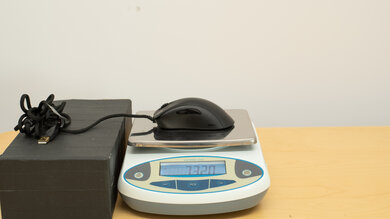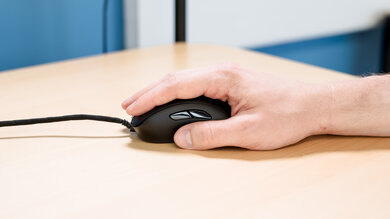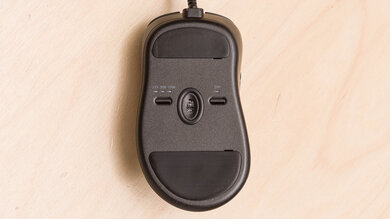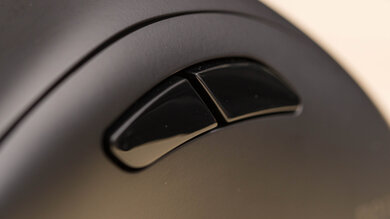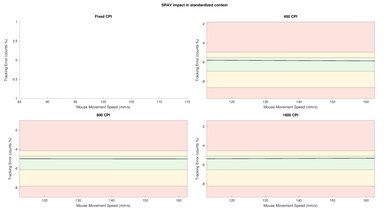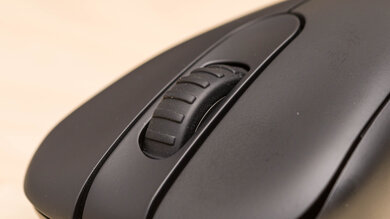The BenQ ZOWIE EC3-C is a new, smaller-sized mouse in the ZOWIE EC series and part of its C-version update, which has several improvements over the previous EC generation. It has an upgraded paracord-like cable, and it feels sturdier overall. Our unit's scroll wheel wobbles a little, but otherwise, the mouse doesn't suffer from the build quality issues we had on our BenQ ZOWIE EC2 unit. It's suitable for most hand sizes using any grip type; however, extra-large hands may feel cramped with a palm grip, and small hands may struggle to reach the front side button with a fingertip grip. Performance-wise, it has low click latency and a low lift-off distance. Unfortunately, its CPI range is narrow, and you're limited to four preset CPI settings, but it may be enough for some gamers.
Our Verdict
The BenQ ZOWIE EC3-C is mediocre for office use since it lacks many features that are useful for work, like L/R tilt buttons on its scroll wheel and a free-scrolling mode. Also, you can't use it wirelessly, and you can't reprogram any of its buttons without using third-party software. On the bright side, it feels very well built, and it's suitable for most hand sizes using any grip type.
-
Suitable for most hand sizes and all grip types.
-
Feels very well built.
-
All default button bindings work on Windows and macOS.
-
Wired-only.
-
No customization software.
-
Scroll wheel lacks L/R tilt buttons and free scrolling.
The BenQ ZOWIE EC3-C is good for FPS gaming. It has low click latency and a low lift-off distance. Also, it's very light and feels very well-built. It has a flexible paracord-like cable with an angled mouse end to prevent drag, smooth-gliding mouse feet, and a right-handed design that's suitable for most hand sizes using any grip type. Unfortunately, there are only four preset CPI settings to cycle through, but this may be enough for some people.
-
Very light.
-
Low click latency and lift-off distance.
-
Suitable for most hand sizes and all grip types.
-
Feels very well built.
-
Flexible paracord-like cable.
-
Limited to four preset CPI settings.
-
No customization software.
The BenQ ZOWIE EC3-C is mediocre for MMO gaming. It doesn't have nearly as many buttons as a dedicated MMO mouse, and you can't reprogram any of the buttons it does have without using third-party software. Also, there are only four preset CPI settings to cycle through. On the bright side, it has a comfortable right-handed design suitable for most hand sizes using any grip type. It has low click latency and a low lift-off distance, although some gamers may prefer them lower.
-
Low click latency and lift-off distance.
-
Suitable for most hand sizes and all grip types.
-
Feels very well built.
-
Flexible paracord-like cable.
-
Doesn't have as many buttons as MMO mice.
-
Limited to four preset CPI settings.
-
No customization software.
-
Scroll wheel lacks L/R tilt buttons and free scrolling.
The BenQ ZOWIE EC3-C is a great ultra-light gaming mouse. It's very light and has low click latency, but you may prefer a more responsive-feeling option if you play fast-paced games often. That said, it feels very well-built, and it has smooth-gliding mouse feet and a flexible paracord-like cable with an angled mouse end to prevent drag. It's suitable for most hand sizes using any grip type.
-
Very light.
-
Low click latency and lift-off distance.
-
Suitable for most hand sizes and all grip types.
-
Feels very well built.
-
Flexible paracord-like cable.
-
Limited to four preset CPI settings.
-
No customization software.
The BenQ ZOWIE EC3-C is inadequate for travel since you can't use it wirelessly, so its cable might be annoying in tight spaces like planes, trains, or buses. On the bright side, it feels well-built, and it's suitable for most hand sizes with any grip type.
-
Very light.
-
All default button bindings work on Windows and macOS.
-
Wired-only.
-
Bulky; may not fit in laptop case.
-
No onboard memory.
- 6.2 Office/Multimedia
- 8.0 Video Games (FPS)
- 6.6 Video Games (MMO)
- 8.2 Ultra-Light Gaming
- 5.1 Travel
- Updated Dec 01, 2022: We've converted this review to Test Bench 1.2. This update simplifies our Weight test and expands on our CPI test from Test Bench 1.1, resulting in changes to test results in both sections. For more details, you can see our complete changelog here.
- Updated Nov 17, 2022: We've converted this review to Test Bench 1.1. This update revamps our Click Latency test and results in changes to test results. For more details, you can see our full changelog here.
- Updated Oct 01, 2021: Review published.
- Updated Sep 29, 2021: Early access published.
- Updated Jul 23, 2021: Our testers have started testing this product.
- Updated Jul 22, 2021: The product has arrived in our lab, and our testers will start evaluating it soon.
- Updated Jul 06, 2021: We've purchased the product and are waiting for it to arrive in our lab.
Differences Between Sizes And Variants
The BenQ ZOWIE EC3-C is available in black only. There's a large-size variant called the BenQ ZOWIE EC1-C and a medium-size variant called the BenQ ZOWIE EC2-C. You can see our unit's label here.
Compared To Other Mice
The BenQ ZOWIE EC3-C is a new, smaller-sized mouse in the ZOWIE EC series and part of its C-version update, which has several improvements over the previous EC generation. It's very similar to the older EC lineup, but it has some improvements, like a paracord-like cable to replace the old rubber ones, a scroll wheel with 24 steps instead of 16 steps, and remedied quality control issues. It's a good choice if you're interested in a straightforward mouse for FPS gaming with no companion software or RGB lighting.
See our recommendations for the best wired mouse, the best gaming mouse, and the best FPS mouse.
The BenQ ZOWIE EC3-C and the BenQ ZOWIE EC2-CW are related gaming mice within the wider BenQ ZOWIE EC lineup. Both mice have the same basic shape but have different size variants. The EC3-C is a wired-only model and a Large size variant within the series. On the other hand, the EC2-CW is a wireless model and a Medium-size variant.
The Logitech G PRO X SUPERLIGHT is an excellent ultra-light wireless mouse, while the BenQ ZOWIE EC3-C is a straightforward wired gaming mouse. The Logitech is significantly lighter, and you can use the Logitech wirelessly with its USB receiver or wired with its cable. It has smoother-gliding mouse feet, a much wider CPI range, an adjustable CPI, and significantly lower click latency. On the other hand, the BenQ has a narrow CPI range, and you can only cycle between four preset CPI settings. However, some people may prefer the BenQ's more straightforward design with no RGB or customization software.
The BenQ ZOWIE EC3-C is a new, smaller-sized mouse in the ZOWIE EC series and part of its C-version update. Compared to the EC2, the EC3-C is slightly shorter and much lighter, and it feels significantly better built. It has a flexible, paracord-like cable instead of the rubber cable on the EC2, and the mouse end of the cable is angled upwards to prevent drag. Its smaller size is better suited for small hands using a claw grip. On the other hand, the EC2's larger size accommodates extra-large hands better for a palm grip. Also, its click latency is lower. Otherwise, both mice use the same sensor and are both limited to four preset CPI settings.
The BenQ ZOWIE EC3-C is a new, smaller-sized mouse in the ZOWIE EC series and part of its C-version update. Compared to the EC1, the EC3-C is much lighter, feels much better built, and is better suited for small hands using a palm or claw grip. It has a flexible, paracord-like cable instead of the rubber cable on the EC1, and the mouse end of the cable is angled upwards to prevent drag. Also, its click latency is lower. Comparatively, the EC2 is better suited for extra-large hands using a palm grip. Otherwise, both mice use the same sensor and are both limited to four preset CPI settings.
The Razer DeathAdder V2 and the BenQ ZOWIE EC3-C are both wired gaming mice. The Razer is a better choice if you prefer having a wider CPI range with an adjustable CPI, many programmable buttons, CPI-switching buttons on the top of the mouse instead of just one on the underside. Also, the Razer has a lower lift-off distance and much lower click latency. If you prefer a more straightforward mouse with no RGB or customization software, the BenQ is a good choice. It has a flexible, paracord-like cable with an angled end to help prevent drag.
The Vaxee ZYGEN NP-01S and the BenQ ZOWIE EC3-C are both wired gaming mice with similar right-handed shapes. They're about the same size and weight, but the BenQ feels a bit more sturdy. Also, the BenQ's cable has an angled mouse end to help prevent drag. On the other hand, the Vaxee has better quality mouse feet and lower click latency. Both mice are suitable for most hand sizes using any grip type, but the Vaxee is more suitable for small hands using a fingertip grip.
The BenQ ZOWIE EC3-C and the Dream Machines DM1 FPS are wired gaming mice with comparable performance. The BenQ is somewhat lighter and feels better built. It also has mouse feet that glide more smoothly, a more consistent sensor, and marginally lower click latency. On the other hand, the Dream Machines has a wider CPI range and lets you adjust the CPI by steps of 200, while the BenQ only has four default CPI presets. The Dream Machines also has customization software, which the BenQ lacks.
The BenQ ZOWIE EC3-C and the Sharkoon Light² 200 have a very similar shape. The Sharkoon has a honeycomb cutout design on its sides and palm rest that help reduce its weight, and it also comes with an alternate solid palm rest. It has a wider CPI range, an adjustable CPI, and a lower lift-off distance. Its CPI switching button is on the top of the mouse instead of on the underside like the BenQ, and you can reprogram all the buttons using the dedicated software. The BenQ has a more straightforward design with no RGB or customization software, and it has somewhat lower click latency.
The GLORIOUS Model D and the BenQ ZOWIE EC3-C are both right-handed, wired gaming mice. The GLORIOUS has is a bit lighter and has a honeycomb cutout pattern on its L/R clicks and palm rest. It has a slightly more flexible cable, better quality mouse feet that glide better, and lower click latency. Also, it has a wider CPI range, and since it has native customization software, you can adjust the CPI precisely in small increments, and you can reprogram most of the buttons. On the other hand, the BenQ feels better built. You can only cycle between four preset CPI settings with a button on the underside of the mouse. However, some people may prefer the BenQ's more straightforward design with no RGB or customization software.
Test Results
If you're interested in a mouse with a similarly straightforward look but with the addition of RGB lighting zones in the palm rest and in a strip along the bottom, check out the Razer Abyssus Essential.
If you're interested in a gaming mouse with similar features but a more lightweight body with honeycomb cutouts, check out the Dream Machines DM6 Holey S.
The mouse end of the cable is angled upwards to help prevent drag.
There are two buttons on the underside of the BenQ ZOWIE EC3-C to cycle between four preset CPI settings and three polling rate options. You can't reprogram any of the buttons without using third-party software. For a similar wired gaming mouse with a dedicated CPI button on the top of the mouse behind the scroll wheel, check out the Dream Machines DM1 FPS.
The polling rate options on the BenQ ZOWIE EC3-C are 125Hz, 500Hz, and 1000Hz. Using a button on the underside, you can cycle between four preset CPI settings: 400, 800, 1600, and 3200.






